Measles cases are surging across the country, fuelled by vaccine hesitancy over the MMR jab.
There were 1,603 suspected cases of measles in England and Wales in 2023, new statistics from the UK Health Security Agency (UKHSA) show.
That’s up from 735 in 2022, and just 360 the year before.
The suspected cases are based on official notifications by doctors making a diagnosis from clinical symptoms. Not all are later confirmed to be measles by laboratory tests.
Public Health Scotland said there have been “very few” cases north of the border.
But according to the UKHSA, cases in the West Midlands are now the highest since at least the mid-1990s.
In the last four weeks of December, there were 57 suspected cases – more than a quarter of the total of 217 for the whole of England and Wales.
Measles fears: London faces ‘very real risk’ of ‘big’ outbreaks due to low vaccination rates
Rise in measles cases triggers warning for parents to check MMR vaccine status before summer holidays
Measles now an ‘imminent’ global threat due to pandemic, say WHO and CDC
Another significant outbreak in London accounted for 44 cases over the same period.
Measles usually starts with cold-like symptoms.
These include a high temperature, a runny or blocked nose, a cough and red, sore, watery eyes.
This is followed a few days later by a rash.
The rash starts on the face and behind the ears before it spreads.
The spots are usually raised and can join together to form blotchy patches which are not usually itchy.
Some people may get small spots in their mouth too.
Dr Naveed Syed, health protection consultant in the West Midlands, said: “We are seeing cases of measles rising every day in the West Midlands.
“The virus is very infectious and can spread rapidly among communities, such as schools, if people have not had at least one dose of the MMR vaccine.
“People may not realise how severe measles can be. While most people will recover within a couple of weeks, the virus can cause serious illness.
“Sometimes this can leave permanent disability and it can even cause death.”
There used to be between 160,000 and 800,000 cases a year in England and Wales.
But since a vaccine was introduced in 1968, it is estimated that 20 million cases and 4,500 deaths have been prevented.
Since 1996 children have been offered two doses of the measles, mumps and rubella (MMR) jab, but uptake needs to be 95% to stop the virus spreading in the community.
NHS figures show that in 2022-23, 84.5% of children had two doses by the time they were five years old, the lowest level since 2010-11, when Andrew Wakefield was struck off the medical register for falsely claiming the jab caused autism.
Vaccine uptake recovered slightly to reach 88.6% in 2014, but has been declining since.
Read more from Sky News:
Post Office ‘could face £100m bill and insolvency’, expert claims
Queen ‘slipped away in her sleep’ in ‘very peaceful’ death
Migrants cross channel to UK for first time in 2024
Be the first to get Breaking News
Install the Sky News app for free
According to the NHS, nine out of 10 unvaccinated children can catch measles if another child in their class has it.
The UKHSA urged parents to check their children have had two doses of MMR. Catch-up vaccination clinics are being organised in some areas.









